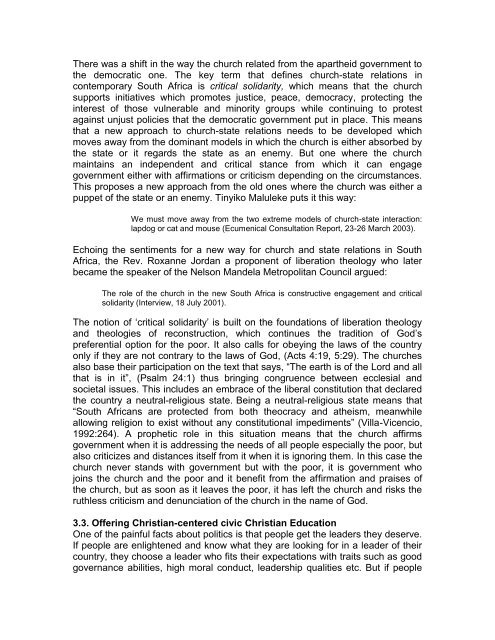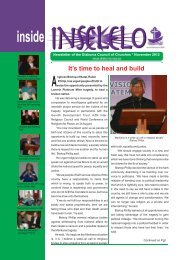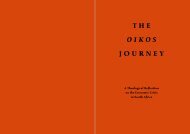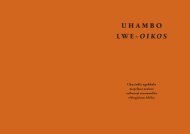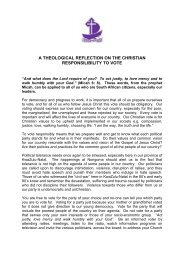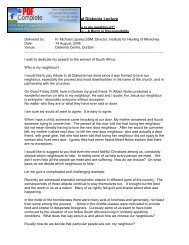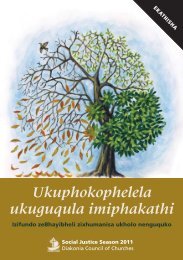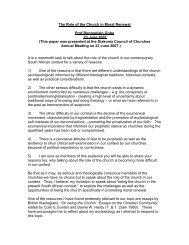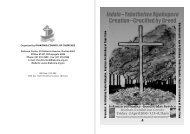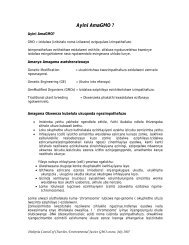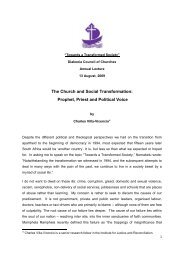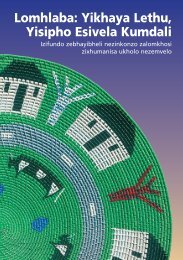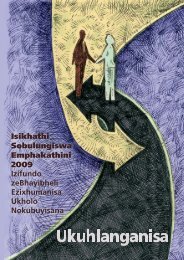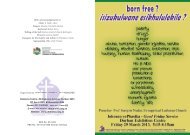a prophetic church in the democratization of the south african society
a prophetic church in the democratization of the south african society
a prophetic church in the democratization of the south african society
Create successful ePaper yourself
Turn your PDF publications into a flip-book with our unique Google optimized e-Paper software.
There was a shift <strong>in</strong> <strong>the</strong> way <strong>the</strong> <strong>church</strong> related from <strong>the</strong> apar<strong>the</strong>id government to<br />
<strong>the</strong> democratic one. The key term that def<strong>in</strong>es <strong>church</strong>-state relations <strong>in</strong><br />
contemporary South Africa is critical solidarity, which means that <strong>the</strong> <strong>church</strong><br />
supports <strong>in</strong>itiatives which promotes justice, peace, democracy, protect<strong>in</strong>g <strong>the</strong><br />
<strong>in</strong>terest <strong>of</strong> those vulnerable and m<strong>in</strong>ority groups while cont<strong>in</strong>u<strong>in</strong>g to protest<br />
aga<strong>in</strong>st unjust policies that <strong>the</strong> democratic government put <strong>in</strong> place. This means<br />
that a new approach to <strong>church</strong>-state relations needs to be developed which<br />
moves away from <strong>the</strong> dom<strong>in</strong>ant models <strong>in</strong> which <strong>the</strong> <strong>church</strong> is ei<strong>the</strong>r absorbed by<br />
<strong>the</strong> state or it regards <strong>the</strong> state as an enemy. But one where <strong>the</strong> <strong>church</strong><br />
ma<strong>in</strong>ta<strong>in</strong>s an <strong>in</strong>dependent and critical stance from which it can engage<br />
government ei<strong>the</strong>r with affirmations or criticism depend<strong>in</strong>g on <strong>the</strong> circumstances.<br />
This proposes a new approach from <strong>the</strong> old ones where <strong>the</strong> <strong>church</strong> was ei<strong>the</strong>r a<br />
puppet <strong>of</strong> <strong>the</strong> state or an enemy. T<strong>in</strong>yiko Maluleke puts it this way:<br />
We must move away from <strong>the</strong> two extreme models <strong>of</strong> <strong>church</strong>-state <strong>in</strong>teraction:<br />
lapdog or cat and mouse (Ecumenical Consultation Report, 23-26 March 2003).<br />
Echo<strong>in</strong>g <strong>the</strong> sentiments for a new way for <strong>church</strong> and state relations <strong>in</strong> South<br />
Africa, <strong>the</strong> Rev. Roxanne Jordan a proponent <strong>of</strong> liberation <strong>the</strong>ology who later<br />
became <strong>the</strong> speaker <strong>of</strong> <strong>the</strong> Nelson Mandela Metropolitan Council argued:<br />
The role <strong>of</strong> <strong>the</strong> <strong>church</strong> <strong>in</strong> <strong>the</strong> new South Africa is constructive engagement and critical<br />
solidarity (Interview, 18 July 2001).<br />
The notion <strong>of</strong> „critical solidarity‟ is built on <strong>the</strong> foundations <strong>of</strong> liberation <strong>the</strong>ology<br />
and <strong>the</strong>ologies <strong>of</strong> reconstruction, which cont<strong>in</strong>ues <strong>the</strong> tradition <strong>of</strong> God‟s<br />
preferential option for <strong>the</strong> poor. It also calls for obey<strong>in</strong>g <strong>the</strong> laws <strong>of</strong> <strong>the</strong> country<br />
only if <strong>the</strong>y are not contrary to <strong>the</strong> laws <strong>of</strong> God, (Acts 4:19, 5:29). The <strong>church</strong>es<br />
also base <strong>the</strong>ir participation on <strong>the</strong> text that says, “The earth is <strong>of</strong> <strong>the</strong> Lord and all<br />
that is <strong>in</strong> it”, (Psalm 24:1) thus br<strong>in</strong>g<strong>in</strong>g congruence between ecclesial and<br />
societal issues. This <strong>in</strong>cludes an embrace <strong>of</strong> <strong>the</strong> liberal constitution that declared<br />
<strong>the</strong> country a neutral-religious state. Be<strong>in</strong>g a neutral-religious state means that<br />
“South Africans are protected from both <strong>the</strong>ocracy and a<strong>the</strong>ism, meanwhile<br />
allow<strong>in</strong>g religion to exist without any constitutional impediments” (Villa-Vicencio,<br />
1992:264). A <strong>prophetic</strong> role <strong>in</strong> this situation means that <strong>the</strong> <strong>church</strong> affirms<br />
government when it is address<strong>in</strong>g <strong>the</strong> needs <strong>of</strong> all people especially <strong>the</strong> poor, but<br />
also criticizes and distances itself from it when it is ignor<strong>in</strong>g <strong>the</strong>m. In this case <strong>the</strong><br />
<strong>church</strong> never stands with government but with <strong>the</strong> poor, it is government who<br />
jo<strong>in</strong>s <strong>the</strong> <strong>church</strong> and <strong>the</strong> poor and it benefit from <strong>the</strong> affirmation and praises <strong>of</strong><br />
<strong>the</strong> <strong>church</strong>, but as soon as it leaves <strong>the</strong> poor, it has left <strong>the</strong> <strong>church</strong> and risks <strong>the</strong><br />
ruthless criticism and denunciation <strong>of</strong> <strong>the</strong> <strong>church</strong> <strong>in</strong> <strong>the</strong> name <strong>of</strong> God.<br />
3.3. Offer<strong>in</strong>g Christian-centered civic Christian Education<br />
One <strong>of</strong> <strong>the</strong> pa<strong>in</strong>ful facts about politics is that people get <strong>the</strong> leaders <strong>the</strong>y deserve.<br />
If people are enlightened and know what <strong>the</strong>y are look<strong>in</strong>g for <strong>in</strong> a leader <strong>of</strong> <strong>the</strong>ir<br />
country, <strong>the</strong>y choose a leader who fits <strong>the</strong>ir expectations with traits such as good<br />
governance abilities, high moral conduct, leadership qualities etc. But if people


